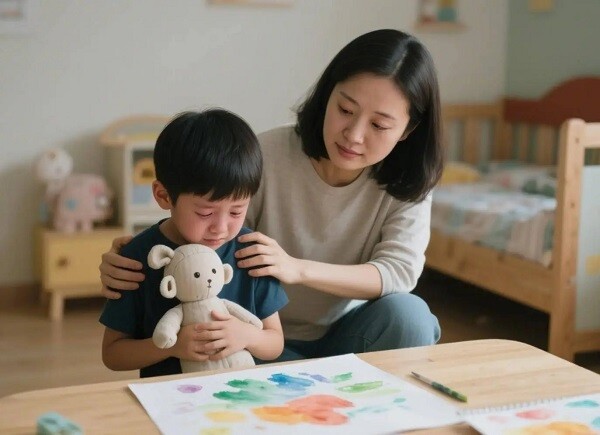It’s important to understand that these four behaviors in children are not something to suppress, but rather, they should be viewed positively and directed towards positive development.


Repeating and Using Logic
According to brain science, a child’s tendency to repeat things is not an act of rebellion but a sign of awakening logical thinking.
A University of Cambridge study on children aged 7-12 found that those who frequently asked questions and engaged in debates scored significantly higher on tests of logical reasoning and problem-solving than their peers.
At this stage, children begin to develop self-monitoring abilities. They are no longer passively absorbing information but actively analyzing, questioning, and constructing their own logical frameworks.
While these back-and-forth conversations can be frustrating for parents, it’s important to understand that the child’s tendency to argue and use logic is not intentional.
In fact, observant parents will notice that smart parents limit their use of commanding tones to prevent their children from arguing back.
So, when your child expresses their opinions, don’t get angry. See it as a sign of their rapid development. The key is to skillfully turn conflicts into cooperation.


Pointing Out Mistakes and Bringing Up Past Issues
“You promised to buy me ice cream yesterday!”
“You said you’d take me to the zoo last month. Why haven’t we gone yet?”
Children who exhibit these behaviors are usually serious and meticulous, with a keen ability to recall past conversations and detect contradictions.
They have their own standards and high expectations for language accuracy, remembering promises made by their parents.

Psychologists have found that children with similar traits tend to have a keen sense of rules.
This behavior reflects exceptional working memory and logical thinking, which are precursors to core skills needed in fields like mathematics, programming, and law.
A study found that children who enjoy pointing out mistakes have denser neural connections between the hippocampus and anterior cingulate cortex, equivalent to having an integrated pulse-width modulator.
So, if your child loves to point out mistakes and bring up past issues, try to affirm their attention to detail. For example, say, “You remember so well! Thank you for reminding me.” This affirmation will encourage your child to be more serious.

Always Asking “Why”
“Why do leaves fall?”
“Why do people sleep?”
“Why is the sky blue?”
Children around the ages of 6 or 7 enter a phase of heightened curiosity, as evidenced by their endless questions and constant “why” inquiries.
While parents initially try to provide answers, they may eventually lose patience if the questions persist.

Studies have found that children who frequently ask questions and seek explanations during kindergarten tend to develop higher-order thinking skills (such as hypothesis formation, argumentation, and systems thinking) earlier.
If parents respond dismissively or angrily, they inadvertently stifle their child’s intellectual curiosity.
Experts advise that if you’re unsure how to respond to a question, acknowledge it positively: “That’s a great question! Let me look into it, too,” or ask, “What do you think the reason is?”
This turns questioning into a joint exploration, benefiting the parent-child relationship and stimulating the child’s curiosity.

Crying Easily and Being Fragile
Children with these traits are considered highly sensitive. According to brain science, their neural mirror systems are often more active than those of other children.
Their emotional radar is finely tuned, allowing them to perceive subtle changes in tone, facial expressions, and the atmosphere around them.
Neuroscience confirms that children with high sensitivity often have enhanced sensory and emotional processing regions in their brains, such as the insular cortex and anterior cingulate cortex.

This is not a weakness but a unique advantage. Many artists and writers, such as JK Rowling, are described as having been highly sensitive as children.
This trait fosters deep empathy and creativity. So, when your child exhibits these traits, it’s essential to first empathize and then guide them in expressing their emotions appropriately.







































